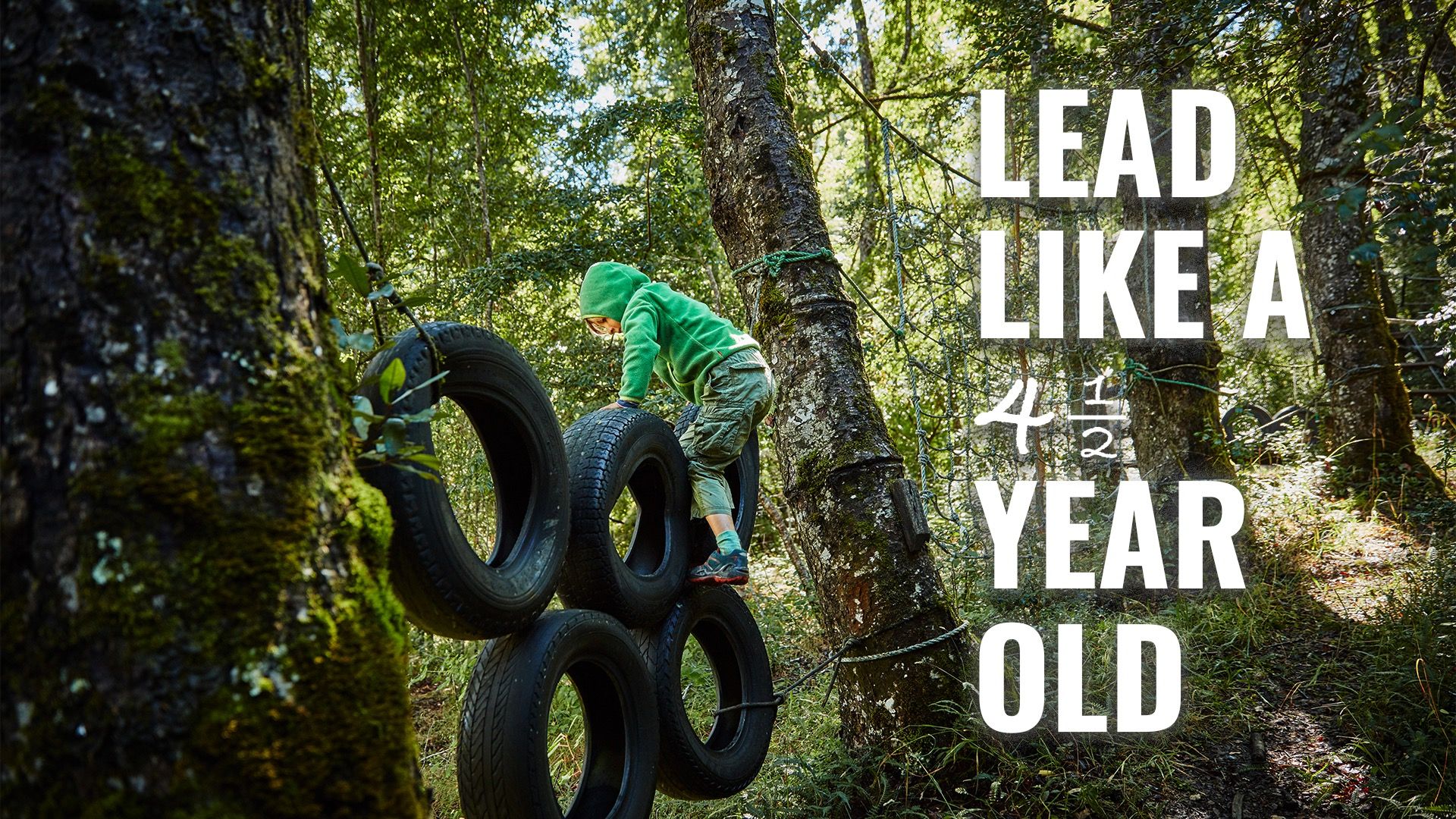Courageous Vulnerability
Aug 21, 2023
A NEW APPROACH
My 4 ½ year old grandson asks questions. A lot of questions. Questions like…
“Do cats eat butterflies?” (No, but they might chase them)
“What is a wildfire?” (a fire that’s out of control – usually in the woods)
“Is a rainbow real” (Yes, but you can’t really touch it)
“Why is soccer a game?” (No idea).
He asks a thousand questions a day, and I hope he never stops. I often wonder how much more I would know if I asked that many questions. I probably don’t because asking questions screams that I don’t know something.
Asking questions makes me vulnerable, and I could be laughed at or considered ignorant about something. My grandson isn’t affected by these fears, so he blatantly displays his vulnerability of not-knowing by asking questions after question.
Now, vulnerability is not the first word that jumps to the forefront of our minds when we think of leadership characteristics and strengths. We gravitate to seemingly strong words like visionary, decisive, inspirational, resilient, courageous. Vulnerability almost sounds weak, and we don’t want to be or follow weak leaders.
But what if we took another look at vulnerability in today’s changing culturescape to see if this seemingly weakness-laden characteristic might just be a secret weapon made of the finest material. What if vulnerability were really a strength?
In my third career, I found myself with a doctorate and standing in a classroom of students at a small, Midwest university. It took me a few years to perfect the technique for the first day of class. I used to ask about each student’s major and where they were from and even why they were taking the class.
Then I would tell them a little about my background as an Army Aviator, a youth worker, a European Director and now a professor. I was speaking from a position of strength, touting my accomplishments hoping that the ultimate goal of proving I was smarter and had more experience would intimidate them into positions of awe and deep respect.
After that first year of being groomed by the classroom, I learned some humility and began to realize that these students absorbed many things through the assigned coursework both in spite of me and because of me.
So, the second year, after their introductions, I chose to ask them what they wanted to know about me. Some asked if the final was cumulative and other course clarifying questions, but most of them asked if I had kids or what I did before coming to that university or what was my favorite football team or what’s my hobby and why. These were questions that allowed/forced me to be vulnerable.
They made me human, and the classroom has never been the same.
Ultimately in one course I laid vulnerability on the line. My final exam consisted of simply identifying 10 things they learned in the course. Along the way, I had realized that students picked up on some things that seemed like minor components to me but ended up rocking their intellectual world!
So, we all sat around the classroom, and I listened to each student share what they, through self-declaration, learned along the way. Setting aside the professorial ego that demanded they learn what I taught and allowing them to assert what had impacted them seemed, at first, incredibly humbling and vulnerable. The more I instituted this newly discovered leadership tactic, the more glorious this vulnerability became. I learned so much from what students said.
It changed my teaching.
VULNERABILITY IN LEADERSHIP
In the TED Talk by Brene Brown, “The Power of Vulnerability,” she discusses the importance of not only understanding vulnerability, but actually embracing it. Brown would reason that vulnerability fosters stronger relational connection with others and, in fact, improves communication between people.
Both interpersonal growth and authentic leadership have a common key component – vulnerability.
I would like to make a point here about the changing values and behavioral variances of generational cohorts. Older people from the Veteran Generation, or sometimes referred to as the Silent Generation, valued stoic, keep-your-problems-to-yourself kind of interactions. It was neither appropriate nor appreciated to bring personal vulnerability into the workplace. It was viewed as weakness, which is where we get the carryover feelings today.
But, as they say, the times have changed, and the Boomer, Gen X, Millennial and GEN Z cohorts have embraced a much more pliable understanding of the workplace reflecting personal life and experiences in more integrative ways. Thus, vulnerability is morphing from a taboo weakness to an acceptable weakness to a potential source of great personal strength for leaders today.
As Sandberg and Grant discuss the concept of resilience, one of their key points is developing support systems for overcoming adversity. Giving and receiving support from necessary support systems requires vulnerability at almost every level. I’ve seen many caring people who are more than happy to lend help to someone else, but when it comes to them receiving assistance of any kind, they refuse it. This is false humility. It is not because they have no needs; it is because they lack the ability to be vulnerable.
Vulnerability, humility, and resilience are intertwined.
Research shows that when leaders acknowledge vulnerabilities, we become more approachable and even relatable. This humanizes us in the eyes of team members. It also creates a sense of psychological safety (safe space) that encourages creativity and collaboration. Further, studies show that teams led by vulnerable leaders tend to be more innovative and resilient because they feel free to take risks.
BEING HUMAN
Let’s look at some ways to incorporate the positive aspects of vulnerability into our leadership strengths and style. I’ll use the acrostic ALIVE, and why not, because true vulnerability declares we are human, thus, we are alive.
A – Ask questions and learn from others. Rather than having all of the answers as the leader (which we never actually do), develop the habit of asking questions of others.
I mentioned my 4 ½ year old grandson who lives with us, and I’m convinced he will one day be the smartest person on earth because he asks 1000 questions in a day. That’s pure childlike vulnerability. He’s not intimidated or embarrassed by not knowing, he stands proudly vulnerable in order to learn.
As leaders, we can look to a child for the courage to be vulnerable in this way. Ask people about their hobbies, their joys, their worries, their purpose, their favorite color, their best day at work, how they celebrate birthdays and other holidays. Get a question book or app online and use it until you get the idea that there are 1000 questions you can ask in a day. Think of how much you will learn from and about others if, in vulnerability, you admit you don’t know everything and open yourself to learning.
L - Listen well. Many will term this active listening. We demonstrate how much we value others when listening to them and involving them in conversations.
We learn when we genuinely listen to people. We also become better conversationalists, we validate their experiences and it helps us understand their perspective. Being vulnerable to not answer everything or defend our position can be hard but worth the interpersonal value derived from this kind of leadership risk.
I – Inspire resilience. Leaders discover ways to personally cope and ultimately thrive in challenging moments.
When it does become our time to speak, we can inspire resilience by telling our stories of hardship and failure and mentors and rebounding and growing and thriving. As leaders and fellow human beings, our stories of finding hope in arduous times offers others insights into building their own resilience. (Sandberg and Grant)
V – Value truth telling. Trustworthiness is the fruit of truth telling being the foundational approach to all your interactions. Telling the truth as a leader builds personal integrity as well as reliability within others.
I learned in the military that leaders only make good decisions when they have good information, and they only have good information when they value truth telling. When people are lauded for telling the truth, even hard truths, they will do so again and again. What a great environment when we choose to be vulnerable by truth telling – always.
E - Embrace risk / encourage risk-taking. We should work at creating a culture that celebrates risk-taking and innovation.
As people, when we know that our failures and vulnerabilities will not be punished or have negative impacts, we are way more likely to take deliberate risks, which may result in creative ideas and solutions. Chances are, we have reached leadership positions because we have taken risks along the way, and most likely because we were in environments where our vulnerabilities were supported.
Clearly it takes courage to be a vulnerable leader; courage to confront our fears, courage to admit our mistakes, courage to ask and listen to others. This requires us to set aside the façade of invincibility and coming face to face with our authentic selves.
Self-awareness is a crucial aspect of courageous vulnerability. We all have fears, biases and personal triggers, so it serves us to understand how these influence our decisions and interactions.
Of course, embracing vulnerability as a strength of our leadership will be challenging at first, but with awareness and cultivating the practice of ALIVE, it will prove to be one of the more fulfilling leadership principles we can learn and employ.
I suggest we adopt my grandson’s attitude toward learning and start asking questions.
“How can we see the sun and the moon at the same time?”
“That’s a humongous spider, can it eat a goat?”
Don’t try to ask a thousand questions the first day, but attempting 10 would be a good goal. Oddly enough, it seems that thinking like a child and being vulnerable can make you a better leader, So, what I’m striving for is to live and lead with the courageous vulnerability of a 4 ½ year old.
Dare to join me.
By Dr. Dave Sanders - Founder, The Shepherd's Tavern
Dave is the founder of The Shepherd's Tavern, a farm and retreat center designed to move you from burnout to renewal through rest.
“Daring Greatly: How the Courage to Be Vulnerable Transforms the Way We Live, Love, parent, and Lead” by Brene Brown
“Option B: Facing Adversity, Building Resilience, and Finding Joy” by Sheryl Sandberg and Adam Grant
TED Talk: “The Power of Vulnerability” by Brene Brown
TED Talk: “The Gift and Power of Emotional Courage” by Susan David
Article: “The Surprising Power of Vulnerability” by David G. Allen (CNN)

